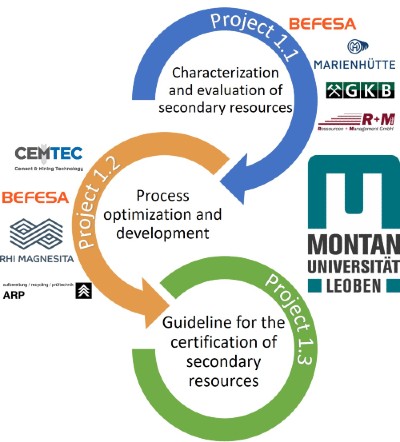While the recycling of metallic scraps (such as car bodies, electronic equipment etc.) is nowadays state of the art, metal-containing by-products from the metallurgical industry represent a new potential secondary resource. Huge amounts of such materials are available both in Austria and worldwide;
 however, their complex composition renders a detailed characterization difficult. This results in rather few and weakly developed recycling concepts available today. To assess these by-products’ potential and their utility as a secondary resource, a more holistic competence in the relevant fields is necessary. The Montanuniversität Leoben has already developed some expertise in the field of typical by-products such as dust, slags and sludge. Due to the genesis of the primary polymetallic ores, the metallurgical processes used in the copper, lead and zinc industries offer particularly high potential by-products. Besides the base metals, also many minor metals, some of them declared as critical by the European Union regarding their future supply, are also in focus of this project. To allow a better assessment of these materials, a certification system, similar to those already existing for primary resources, needs to be established. Therefore, a competence network including scientific and industrial partners will be formed combining the main fields of characterization, mineral processing and metallurgy and be able to generate sufficient know-how and expertise to develop a certification system for metallurgical by-products. This, in turn, will be of major use as a basis for feasibility studies leading to investment decisions, turning these materials into valuable resources. The project structure is divided into the three sub-projects “characterization and evaluation of secondary resources”, “process optimization and development” as well as the development of a “guideline for the certification of secondary resources”. Close cooperation with industry partners regarding their recycling potential provide the best means to develop appropriate methods to judge the economic viability of individual products. Such competences are already expected by the European community as well as outside Europe. The consortium within the proposed COMET-Project is supported by international experts in the assessment of primary resources. This approach will place the consortium in a special position, becoming the first institution worldwide that is able to evaluate and assess secondary metal-bearing resources for the future supply of society´s needs. Thus, the project follows the idea of a “circular economy” in terms of a sustainable use of raw materials. The optimized use of by-products as secondary raw materials helps to preserve valuable primary resources and minimizes landfilling of potentially hazardous wastes. An evaluation system followed by a certification step is beneficial for both continuously produced metallurgical by-products and landfilled materials from the past. Step by step, these resources will be opened to recycling, offering new potential to enlarge the present metal resource base. The industrial partners within the project will especially benefit from a significant market edge, an expanded product range as well as a higher flexibility in raw materials supply and lower amounts of accruing residues. This will create a stronger business location for Austria in parallel to international recognition of both industrial and scientific partners.
however, their complex composition renders a detailed characterization difficult. This results in rather few and weakly developed recycling concepts available today. To assess these by-products’ potential and their utility as a secondary resource, a more holistic competence in the relevant fields is necessary. The Montanuniversität Leoben has already developed some expertise in the field of typical by-products such as dust, slags and sludge. Due to the genesis of the primary polymetallic ores, the metallurgical processes used in the copper, lead and zinc industries offer particularly high potential by-products. Besides the base metals, also many minor metals, some of them declared as critical by the European Union regarding their future supply, are also in focus of this project. To allow a better assessment of these materials, a certification system, similar to those already existing for primary resources, needs to be established. Therefore, a competence network including scientific and industrial partners will be formed combining the main fields of characterization, mineral processing and metallurgy and be able to generate sufficient know-how and expertise to develop a certification system for metallurgical by-products. This, in turn, will be of major use as a basis for feasibility studies leading to investment decisions, turning these materials into valuable resources. The project structure is divided into the three sub-projects “characterization and evaluation of secondary resources”, “process optimization and development” as well as the development of a “guideline for the certification of secondary resources”. Close cooperation with industry partners regarding their recycling potential provide the best means to develop appropriate methods to judge the economic viability of individual products. Such competences are already expected by the European community as well as outside Europe. The consortium within the proposed COMET-Project is supported by international experts in the assessment of primary resources. This approach will place the consortium in a special position, becoming the first institution worldwide that is able to evaluate and assess secondary metal-bearing resources for the future supply of society´s needs. Thus, the project follows the idea of a “circular economy” in terms of a sustainable use of raw materials. The optimized use of by-products as secondary raw materials helps to preserve valuable primary resources and minimizes landfilling of potentially hazardous wastes. An evaluation system followed by a certification step is beneficial for both continuously produced metallurgical by-products and landfilled materials from the past. Step by step, these resources will be opened to recycling, offering new potential to enlarge the present metal resource base. The industrial partners within the project will especially benefit from a significant market edge, an expanded product range as well as a higher flexibility in raw materials supply and lower amounts of accruing residues. This will create a stronger business location for Austria in parallel to international recognition of both industrial and scientific partners.